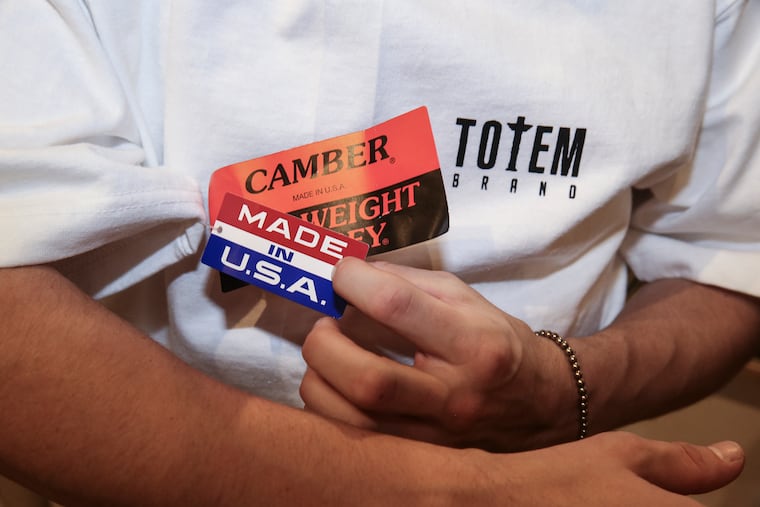Local clothing company Camber USA grabs the spotlight by avoiding it
The small clothing manufacturer in Norristown has gained international clout among menswear enthusiasts who prize quality construction and take stock in the product’s American-made status.

When Londoners Lachlan Burns and Liam Emmett launched Dinner With Friends, the Instagram account where they hawk quality menswear, some of their initial products for sale were three downy hoodies that took up an entire carry-on suitcase brought by a friend from the United States.
The heavyweight jersey goods were by Camber USA, an independent apparel manufacturer in Norristown, whose modest designs are coveted by a small but passionate group of menswear enthusiasts worldwide for their quality, construction, and fit.
It only adds to the allure that the products are notoriously hard to get.
Looking for Camber USA in Philadelphia? Good luck with that. The company’s burgeoning virality was spotlighted in late May by the Wall Street Journal, which pondered if “this Pennsylvania company makes the world’s best hoodies?”
Even if that question proves true, the brand’s nondescript products are just as tough to get near their place of production. (A few shops, like Totem Brand Co. on South Street, carry Camber in the form of printed merch, placing their logo on the blank gear.)
On top of its scarcity, Camber’s stateside authorized retail online dealer, All USA Clothing, has about as much visual finesse to draw buyers in as Camber’s own dated wholesale website.
So how is it that these so-uncool-they’re-cool products garnered such a dedicated following?
For a start: the brand’s commitment to using American grown fiber and milled fabric, and to constructing their designs on-site rather than outsourcing them, has won Camber praise. Founder Barry Schwartz says the majority of the company’s products are now sold overseas, with 40% to 50% of the brand’s annual sales coming from retailers in Japan.
“In the United States we’re so hooked on this immediate gratification process,” Schwartz said. “That means if I could just run over to Walmart and pick up a sweatshirt, even if it doesn’t hold up, it’s gonna get me through to tomorrow.”
While cheaply constructed fast fashion remains the norm in the United States, Japanese street style plays a major influence on trends here, said Christanna Ciabatonni, a media and brand-building expert at public relations agency Skai Blue Media. Camber’s products that are popular overseas reflect a trend towards basic, comfortable, and sturdy fashion.
“It’s definitely not every day that you hear someone from Japan say ‘I gotta get that sweatshirt. It’s produced in Norristown, Pennsylvania,” quipped Ciabatonni, a Norristown native.
Despite its brag-worthy construction, the company’s products aren’t a small investment. On All Seasons Uniforms, Camber’s cross-knit pullover hooded sweatshirt retails for $75.95 (with the caveat that, due to an increase in demand, there’s no discernable way to know when the garment will ship.)
The company that would become Camber USA was founded in 1982 by Schwartz, who remains the sole proprietor, and officially took on the moniker in 1993. Two years later, Camber moved into its current factory—a former wool mill at 2 DeKalb Street where, Schwartz says, uniforms were produced during the Civil War. Camber’s output now is hemmed in by what it’s possible to produce in the 80,000-square-foot factory with 48 full-time employees, but Schwartz is content with where the company’s at.
Camber has done about $4 million in annual sales for the past four years, with the output of products increasing by about 10% each year over that period of time. It’s a testament to the see-it, gotta-have-it power of the Internet: Camber does no advertising, and Schwartz says there’s no one product that’s more popular than the next. They all serve a need, from the workwear safety shirts with reflective banding to the hoodies that have gripped the fashion conscious today.
Anthony Lee, a content creator based in Liverpool, first heard of Camber after a friend raved over their products. Lee’s Instagram page is dotted with snapshots of minimalist, useful , but undeniably fashionable outfits. His Camber products have become the garments he measures other heavyweight jerseys against. “I love that they’re made in the United States. I think that gives you some kind of quality guarantee,” Lee said. “I also love that they’re completely unbranded besides the tag on the inside, nothing fancy, just a proper, good basic sweatshirt.”
Camber’s products certainly aren’t hewed by trends. They’ve offered the same 30-or-so styles in 11 colors for years. After a tiresome circuit of trade shows, Schwartz surmised that workwear and basics would serve their customers best. The company has been following that assumption ever since. “I felt like if we stay true to what we represent as a very high quality, long-lasting American product, our customers would appreciate it no matter what year it is,” Schwartz said.
The longevity of Camber products—that “they can take a real beating before having to be replaced,” in Lee’s words—is part and parcel of its appeal. Tom Chudley, director and founder of London’s Blacksmith Store, said he believes the demand for Camber holds an element of reaction to the current state of consumerism. “People don’t buy it because it’s cheap and readily available, nor do they buy it because it’s heat-of-the-moment trendy,” Chudley said. “Camber is the antithesis to fast fashion. The kind of authentic that you cannot fake or buy with a marketing budget.”
Ciabatonni, the brand-building expert, agrees. “Products get cult followings like this because they’re based on merit, and they’re not chasing clout,” she said. “If your product speaks for itself, then it’s going to rise to the top.”